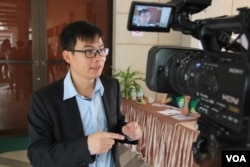Cambodia needs to improve its production standards and enter a regional partnership before it is ready for a major US trade treaty, economists say.
US President Barack Obama is working toward a Trans-Pacific Partnership with many other countries, but economists say Cambodia should first focus closer to home, working to enter the Regional Comprehensive Economic Partnership, a Chinese-backed treaty established in 2012.
“I think a priority for Cambodia is to focus on the RCEP at the moment,” said Chheang Vannarith, an economist and lecturer at the University of Leeds, in the UK. “Then we can make a request to the partners of the TPP once we are ready.”
The TPP has 11 member states, plus the US: Australia, Canada, Chile, Japan, Mexico, Peru, New Zealand, along with Asean members Brunei, Malaysia, Vietnam and Singapore. RCEP, meanwhile, would group all Asean states with China, Australia, Japan New Zealand, and South Korea, but it would exclude the US.
Both trade deals would provide access for Cambodia’s goods to a huge market, and even though the TPP would provide more benefits, the TPP’s standards are higher, Chheang Vannarith said.
Cambodia’s GDP was $15.2 billion in 2014, and it is expected to grow above 7 percent in the next two years, given political stability.
Paul Chambers, a political affairs professor at Chiang Mai University, told VOA Khmer that TPP is too broad for Cambodians and could potentially dominate the country’s economy.
“For Cambodia, TPP might only be beneficial in attracting companies interested in the cheapest labor—but at the lowest wages,” he said. “However, for Cambodian labor unions, Cambodians seeking a better environment, Cambodians not wanting to see foreign corporations dominate their economy, Cambodians wanting to have more affordable medicine, then the TPP is certainly no panacea.”
The TPP and the RCEP will compete, Chambers said.
Chan Sophal, an economist and director for the Center for Policy Studies, said Cambodia’s situation is better suited to RCEP, because it was established based on Asean, rather than the US, which stands the most to gain from TPP.
Obama has said the TPP is necessary “to make sure America writes the rules for the global economy.” But it is unclear how much competition it will create within China’s sphere of influence.
Chan Sophal said that means the US is working to collect support for the benefit of its politics and economy. Meanwhile, it has been criticized by Prime Minister Hun Sen as divisive for Asean.
Chheang Vannarith, however, said the TPP is an open partnership organization, though Cambodia is not ready to join it. “Once a country is ready, it can make a request,” he said, “including China.”






